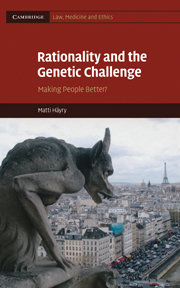Book contents
- Frontmatter
- Contents
- Preface
- 1 Seven ways of making people better
- 2 Rational approaches to the genetic challenge
- 3 The best babies and parental responsibility
- 4 Deaf embryos, morality, and the law
- 5 Saviour siblings and treating people as a means
- 6 Reproductive cloning and designing human beings
- 7 Embryonic stem cells, vulnerability, and sanctity
- 8 Gene therapies, hopes, and fears
- 9 Considerable life extension and the meaning of life
- 10 Taking the genetic challenge rationally
- Bibliography
- Index
9 - Considerable life extension and the meaning of life
Published online by Cambridge University Press: 05 July 2014
- Frontmatter
- Contents
- Preface
- 1 Seven ways of making people better
- 2 Rational approaches to the genetic challenge
- 3 The best babies and parental responsibility
- 4 Deaf embryos, morality, and the law
- 5 Saviour siblings and treating people as a means
- 6 Reproductive cloning and designing human beings
- 7 Embryonic stem cells, vulnerability, and sanctity
- 8 Gene therapies, hopes, and fears
- 9 Considerable life extension and the meaning of life
- 10 Taking the genetic challenge rationally
- Bibliography
- Index
Summary
In this chapter, I describe attempts to extend the human lifespan and examine the main ethical responses to these attempts. Factual and theoretical accounts of mortality and life extension are followed by analyses of the moral notions that have been used to reject or to defend induced considerable longevity.
Mortality and ageing
Human life begins at conception, or during pregnancy, or at birth; but it ends at death. Attempts at life extension are always also efforts to postpone death, although other things, such as the health and happiness of individuals and groups while they are still alive, can be independently valued in the planning and execution of these attempts. It is a conceptual truth that if death could be overcome, we could live forever.
Three factors contribute to human mortality, namely, trauma, disease, and ageing. The prevention and treatment of trauma and disease are time-honoured methods of postponing death and improving life quality; and as long as we are subject to biological vulnerability, these will be needed in life extension. But the ultimate challenge to considerable longevity is ageing. If human beings as biological organisms have a set expiry date, say, of a little over a hundred years from birth, then all we can do is to avoid accidents and illnesses and live as well as we can until the date is reached and our time is up. The question is, is this the case or can ageing be halted or reversed?
- Type
- Chapter
- Information
- Rationality and the Genetic ChallengeMaking People Better?, pp. 195 - 219Publisher: Cambridge University PressPrint publication year: 2010
- 1
- Cited by

